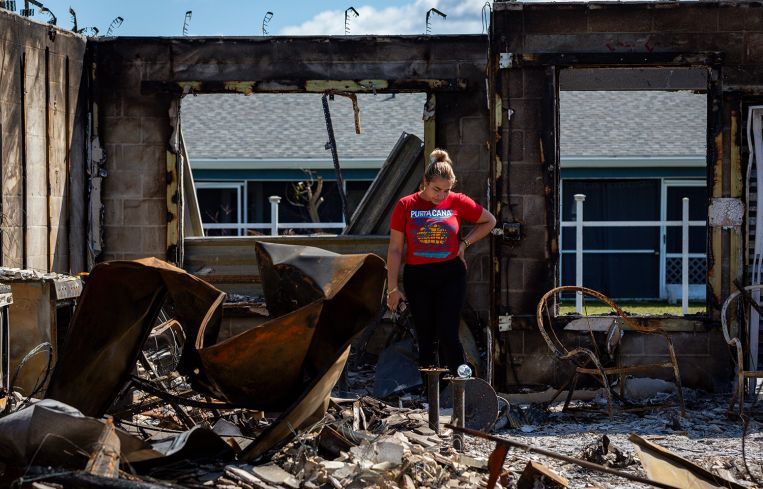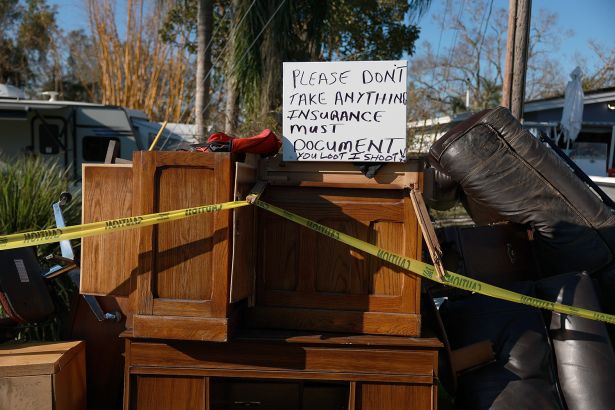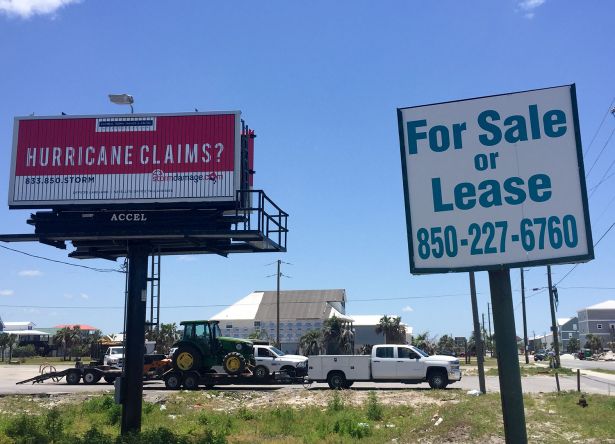Florida’s Property Insurance Market: Sunnier Skies Ahead After Hurricanes
New laws, a state-run firm and fresh private insurers are buoying a setup that seemed to be sinking only two years ago
By Mike Seemuth October 30, 2024 6:00 am
reprints
Florida’s government-backed property insurance market appears staggered but stable after two major hurricanes hit the state in just 13 days.
Hurricane Milton and Hurricane Helene triggered a torrent of property damage claims but haven’t exhausted funds to pay claims at state-run Citizens Property Insurance, the largest insurer of Florida homes against wind damage. Florida’s state-run hurricane catastrophe fund still has a blue-chip credit rating and serves as a low-cost source of reinsurance for property insurers. And more insurers have entered the Florida market, adding to competition that could restrain the rise of the state’s sky-high property insurance premiums.
Citizens Property Insurance went into the 2024 hurricane season in improved financial health after earning net income of $746.5 million in 2023, compared to a net loss of $2.24 billion in 2022. Citizens’ good fortune wasn’t an outlier. Excluding Citizens, the 50 largest property insurance companies in Florida earned a collective profit in 2023 for the first time in seven years, according to analytics firm S&P Global Market Intelligence, a unit of credit rating agency Standard & Poor’s. The state’s top 50 private property insurers had combined net income of $147 million in 2023 after enduring collective net losses of $1 billion in both 2022 and 2021.
“Florida property insurers benefited from a mild hurricane season and a meaningful increase in investment income in 2023,” S&P Global reported. “While the industry still recorded an underwriting loss, it was much narrower than in recent years, and there are early signs that recent legislative reforms will benefit the troubled market.”
Those legislative moves were aimed at reducing litigation over property insurance claims. When defending suits over claims, insurers are no longer required to pay the attorney fees of a plaintiff who is an assignee of the policyholder, such as a construction contractor, thanks to legislation enacted in 2021.
State lawmakers went further in 2022 and prohibited policyholders themselves, not just their assignees, from recovering attorney fees from property insurers that they sue over claims. Gov. Ron DeSantis and the state legislature also have prohibited Florida property insurance policyholders from assigning the benefits of their policies to contractors or other third parties.
Those actions may be helping the industry. The number of new lawsuits against Citizens Property Insurance over claims from non-catastrophic storms declined 20 percent in the first seven months of 2023, compared to the same period in 2022. S&P Global also reported that property insurers in Florida collectively incurred $739.2 million of legal defense and cost-containment expenses in 2023, the lowest total since $637.1 million in 2019.
“The Florida Office of Insurance Regulation continues to see overall market stabilization following the historic legislative reforms,” the state agency reported in July. “Rate filings for 2024 show a slight trend downward for the first time in years, indicating stabilization of the property insurance market. Ten companies have filed a zero percent increase, and nine companies have filed a rate decrease to take effect in 2024.”

Legislative efforts to hold down litigation expenses have encouraged some property insurance companies to enter the Florida market. The Florida Office of Insurance Regulation approved applications by six insurance companies to start selling residential property coverage in 2024. The more, the merrier, of course, but Florida property insurance premiums remain the highest among the 50 states. Florida’s average annual property insurance premium for $300,000 of coverage is $5,527 this year — more than double the national average of $2,285 — according to a study by Bankrate.com.
Florida resident Pamela A. Butler is wondering how much more she might have to pay for insurance. Butler pays annual premiums totaling $7,500 for wind and flood insurance for her house on Pine Island, a barrier island along Fort Myers. She bought the concrete, ranch-style house for $535,000 in September 2002. One week after she closed, Hurricane Ian made landfall in southwest Florida as a Category 5 storm and battered her one-story house, leaving a damaged roof, missing windows and doors, and extensive interior water damage.
Now equipped with a new metal roof and impact windows, Butler’s 1970s-vintage concrete house was undamaged by either Hurricane Milton or Hurricane Helene. But flooding devastated lower-lying areas of Pine Island, and Butler worries that the back-to-back storms will push her high insurance premiums even higher.
“What’s going to happen after this? I don’t know what’s going to happen with these insurance prices,” Butler said. “I did OK, because our home is in a neighborhood that is one of the higher elevated neighborhoods [in Pine Island]. There are some neighborhoods at much lower elevations that, believe it or not, have flooded for the third time.” Those floods occurred Oct. 9 with Hurricane Milton, during Hurricane Helene 13 days earlier, and with Hurricane Ian about two years ago.
Even before the one-two punch of Helene and Milton, Butler and other policyholders of Citizens Property Insurance were on course to pay higher premiums next year. About two weeks before Helene made landfall just ahead of Milton, Citizens announced regulatory approval of an average premium increase of 14 percent effective next year. In a Sept. 10 press release, the state’s biggest property insurer said the double-digit increase will reduce the risk that other companies’ Florida policyholders “would be forced to pay assessments on Citizens’ losses following a major storm, if Citizens exhausted its ability to pay claims.”
Policyholders of Citizens — and potentially other insurance companies — pay a penalty if Citizens runs out of funds to pay claims. Such a deficit legally requires Citizens to levy a policy-holder surcharge up to 15 percent of the annual premium, which can be used to secure bond financing. And, if that’s not enough, Citizens can impose an emergency assessment up to 10 percent on its own policyholders as well as Florida’s private-market policyholders — and not only people with homeowner’s insurance policies but also those with auto, boat, renters and pet insurance in Florida.
Nevertheless, the insurer says it’s exiting 2024 in good stead.
“Citizens is in a strong financial position and able to handle all claims for hurricanes Helene and Milton without having to levy surcharges or assessments,” Citizens spokesman Michael Peltier said in an Oct. 10 email.
Despite its position as the largest insurer of Florida homes against wind damage, Citizens Property Insurance is legally prohibited from charging below-market premiums to compete with private property insurers. On the contrary, the state-run insurer conducts an ongoing “depopulation” program to reduce the number of Citizens policies in force by transferring them to private insurers. Citizens had 1.26 million policies in force on June 30, down from a peak of 1.4 million in September 2023, but about double the number in September 2020.

While the entry of new property insurers might make pricing more competitive in Florida, the state’s underwriting climate can prove too harsh for some companies. In 2022, six privately owned property insurers with 307,000 Florida policyholders were liquidated after slipping into insolvency, according to the Florida Insurance Guaranty Association (FIGA), which ensures that the contracts of failed insurance companies are honored. Credit rating agency Fitch Ratings reported Oct. 10 that, following Hurricane Milton, insurance companies specializing in Florida property coverage “are vulnerable to the extent this major hurricane generates losses in excess of reinsurance limits.” (Fitch, it should be noted, does not rate insurance companies specializing in Florida property coverage.)
Reinsurance — essentially insurance for insurance companies — often pays claims of hurricane damage to Florida properties. Florida property insurers collectively increased their reinsurance coverage by 11 percent in 2023, compared with 2022, and they paid 27 percent more on a risk-adjusted basis for the coverage, according to the Florida Office of Insurance Regulation. But the agency also reported that preliminary 2024 data on reinsurance purchases by Florida property insurers “suggests price stabilization, with anticipated flat or decreased risk-adjusted costs, from 2023, on average.”
A distinct feature of the Florida property insurance market is a state-controlled fund that operates like a reinsurer. The Florida Hurricane Catastrophe Fund (FHCF) usually offers reinsurance at lower rates than private reinsurers because the state entity is exempt from federal tax and doesn’t include a profit margin in its reinsurance rates. The fund stands ready to reimburse 45 percent, 75 percent or 90 percent of catastrophic-storm losses at property insurance companies in Florida, depending on the terms of the fund’s annual contract with each insurance company.
As 2024 began, the catastrophe fund was still paying reimbursements for losses resulting from Hurricane Michael in 2018 and Hurricane Ian in 2022. By the end of 2023, the catastrophe fund had reimbursed 38 insurers for Hurricane Michael losses and 61 insurers for Hurricane Ian losses. The fund projects it will incur total losses of $1.45 billion from Michael and $10 billion from Ian.
Due to the surge of insurance claims from hurricanes Helene and Milton, the Florida Hurricane Catastrophe Fund may deepen its financial liquidity by issuing bonds backed by assessments paid by insurers.
“The FHCF would need to rely on post-event bonding and emergency assessments to pay claims if a storm or storms of moderate to significant magnitude impacted Florida in the 2024-2025 contract year,” according to a February 2024 report by investment banking firm Raymond James & Associates, a financial adviser to the fund.
Raymond James also reported that the Florida fund has ample fundraising ability in the bond market. “The FHCF has no post-event bonds outstanding, and the FHCF is a well-regarded, highly rated credit,” the investment banking firm reported, citing the fund’s lofty long-term credit ratings from Standard & Poor’s (AA), Fitch (AA) and Moody’s (Aa3).
Hurricane Helene flooded areas along Florida’s west coast before making landfall Sept. 26 as a Category 4 storm in the state’s lightly populated Big Bend region. Hurricane Milton traversed the Gulf and intensified to a Category 5 storm as it headed toward the densely populated Tampa area, then veered south of Tampa and made landfall as a Category 3 near Siesta Key, a small city with a population of about 5,000. Both Milton and Helene brought destructive winds and flooding to Southwest Florida, a region still recovering from Hurricane Ian in September 2022.
“It’s the price of living in paradise. We are aware of the danger of living in a hurricane zone on a barrier island, and we continue to choose to do so,” says Jacki Liszak, executive director of the Fort Myers Beach Chamber of Commerce. “Unfortunately, there are many people who, with each one of these storms, decide they just can’t do it anymore. … The hard part is for the people whose homes are at grade. Many of those who didn’t flood with Helene flooded with Milton.”
Trying to settle with insurers can be the most difficult post-storm struggle. Liszak said her sister just recently settled an insurance claim for damage to her house when Hurricane Ian roared through the Fort Myers area two years ago. “I know plenty of other people who are now going to [insurance] mediation, and who have passed mediation,” she said, “and are going to trial or have gotten a settlement, and the insurance company has gone back and appealed it.”



